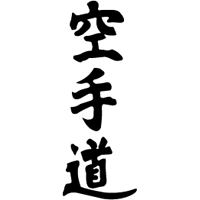
Karate - Brief history
Karate is originally from India or China, approximately twelve centuries ago. As the art was developed, studied, cultivated and transmitted through the generations, changes and contributions were added to the formation of the different styles of Karate in evidence today.
For millennia there were already forms of fighting without weapons, and at the time of the samurai in Japan, the concept of sport did not exist. Warriors also practiced martial arts as a form of physical exercise, through which they educated discipline, morality, civility and imposed peace and morality on their nation.
The main responsible for the development of Karate was the master Gichin Funakoshi, who introduced Karate as a sport in Japan and was invited by the Japanese Ministry of Education to teach Karate in schools and universities in the country. Master Funakoshi intended with his method that aimed at physical education as a form of self-defense, allied to the philosophy of the samurai, but with a scientific basis, to help students in their formation as useful men and citizens to society, all without losing the true martial spirit of the fight.
Karate was considered "divine art" for its great efficiency in real combat. One of the most important facts for the development of Karate was the emergence of "Karate - competition" as a sport. In the 30s and 40s, Karate began to spread throughout the world. Those few individuals, who have really reached a high status in the art of Karate, exhibit abilities that seem to be close to the limits of human potential.
The Karate practitioner, a person highly trained in physical-mental aspects, when confronted with the attacker, presents a differentiated behavior and gives evidence of feelings completely unusual to someone so threatened. There is a break in intellectual thinking and emotions such as anger, fear and pride. Instead, he does not feel as an individual separate from his surroundings, as an individual in his environment. Even your opponent is seen as an extension of himself. It is natural that such subjective feelings are open to scientific study.
The word "Karate" is derived from an expression used in Zen philosophy, which can be considered an integral part of Eastern philosophy. The word "sora" which is also pronounced as "kara" or "kuu", represents the universe. In Zen thought, the word contains the act or process of liberating the person or his ego, achieving a state of mind that is not affected by anything, that is, a state of non-existence. This "state" means the effort to rid the person of any kind of desire and develop a respectable character. Therefore, the real purpose of Karate is to train in such a way that the practitioner can live in a pleasant, healthy, honorable and dignified way, without creating problems, without fearing the strong or powerful, without humiliating himself before the influential man, and without becoming blind for the riches of the earth (detachment). This balance exists through the In and You, which together form the universe, in a combination of positive and negative.
The current meaning of Karate is due to the master Gichin Funakoshi, who, changing the original meaning of the name, introduced the word KARA with the meaning of emptiness, Heaven, Universe. TE means hand and DO way. Literally Karate means the path of empty hands (That's why it is said that the karate fighter uses his own body as weapons to fight) or in a more philosophical sense, path that contains the universe.
